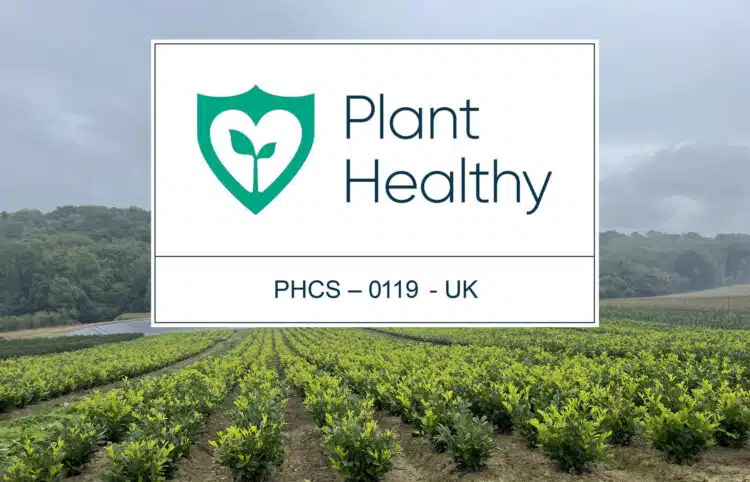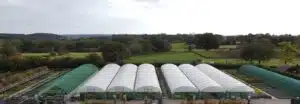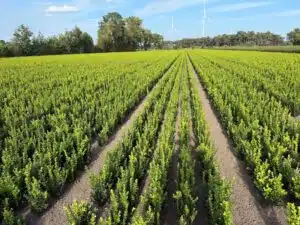HALF PRICE WINTER SALE – AN EXTRA 10% OFF SALE PRICES WITH CODE XMAS10
Menu
HALF PRICE WINTER SALE – AN EXTRA 10% OFF SALE PRICES WITH CODE XMAS10
 https://www.hopesgrovenurseries.co.uk/wp-content/uploads/2025/11/ph-for-blog-750x482.jpg
https://www.hopesgrovenurseries.co.uk/wp-content/uploads/2025/11/ph-for-blog-750x482.jpg
We are one of just a handful of online nurseries to have attained Plant Healthy certification. In a nutshell, it’s a way of proving that we will always do the right thing in preventing the spread of harmful plant pests and diseases.
The Plant Healthy Management Standard is a voluntary initiative that sets out requirements for implementing effective plant biosecurity systems that can be adopted by horticultural businesses. Hopes grove Nurseries chose to be part of the scheme earlier this year, after a lot of preparation we received our independent audit in October 2025 and passed with flying colours!

Why is it important?
The most common way for new plant pests, diseases and noxious weeds to be introduced to a new area is by the movement of live plants. Sadly there are recent examples of this happening such as Ash Die Back disease that was introduced to the UK back in 2012 on an infected batch of imported Ash seedlings. Also, Oak Processionary Moth which piggy-backed in egg form on the canopy of imported Oak Trees that were planted into a prestigious London development.
The consequences of new pests and diseases becoming established in our landscapes can be devastating, they have the potential to wipe out entire native plant species that could then be lost forever, permanently eroding our ecosystems and reducing the diversity of wildlife enjoyed by future generations.
At Hopes Grove Nurseries we deliver tens of thousands of orders to gardeners and professionals all over the UK each year. We acknowledge the responsibility that comes with our role as a major plant supplier in ensuring that notifiable plant pests and diseases are not spread by the plants that we supply, and we have taken proactive, tangible action by becoming Plant Healthy .
What are we doing differently?
We have always taken plant health very seriously long before our accreditation, but now we can prove it with an independently audited paper trail that goes all the way from the seeds and unrooted cuttings at the beginning of the growing cycle right through to the final product plants that we sell on our website.
Should there be a problem with plants that we have supplied, we have proved that we can quickly and easily identify the source of those plants, back through our own production and if applicable – further back in the supply chain.
Where do the plants that you sell come from?
Not all our customers know it, but we are much more than just another website selling Hedging Plants! Most of the plants you see on this website have been grown from scratch on our own nursery sites here in Kent (almost 200 acres of them now). Unlike so much of our competition, our business has never relied on ‘drop shipping’ your plant order from an anonymous bulk supplier. We get our hands dirty by firstly growing and then picking your plants fresh from our very own growing beds, and we are convinced that you will always get better plants and a better deal that way.

From our very first days back in 1992 when I started the company as a fresh-faced Horticulture Graduate, I have believed that UK grown is the best option, we try to produce as many of our own plants as we possibly can. It reduces the odds of importing unwanted pests and diseases, it keeps our skilled permanent staff busy during the quieter times of year, and you get plants that are already acclimatised to UK conditions.
Our Plant Healthy accreditation shows that we are professional in all aspects of our production process and take every opportunity to mitigate the risks posed by plant pests and diseases. We audit our input suppliers against the same standard, we have a disciplined crop walking/monitoring schedule that includes pests and diseases in the wider environment around the nursery as well as within it. We have an ongoing pest and disease staff training programme, a policy of continuous improvement and our external BASIS qualified agronomist always on hand to assist and provide further guidance or a second opinion.
What about the plants that we import?
Despite our best efforts, we cannot grow everything, and it is a sad fact that there are many plants that are simply not grown on UK nurseries in any kind of commercial quantities. We are doing our best in our own way to reverse this trend, but for now, if we are to sell them then we must import them.

When we do import plants, we always do so responsibly with all due diligence (and that always starts with a personal nursery inspection from yours truly, before we agree to buy anything). Importing plants is never our first option, but where it is necessary you can be certain that we have done it responsibly and only from my European colleagues who can show me they are employing best practice on their own nurseries.
Every plant you sell is completely free of all pests and diseases?
Not exactly. The aim of the Plant Healthy Scheme is to minimise the risk of the spread of new pests and diseases that would pose a danger to crops, gardens and the wider environment. It’s not meant to be a guarantee that there might not be a couple of stray greenflies in your order.
UK native plant pests and diseases will pop up on nursery crops with predictable regularity, they will be naturally present in the trees, hedgerows and gardens that border our nursery sites. We will of course take all responsible, proportionate actions to control them so that the plants we sell are strong, healthy and have every chance of performing well in your garden.
In the past we would have eradicated them, probably with chemicals sprayed onto our crops several times, obliterating all kinds of beneficial organisms into the bargain. Thankfully times have changed and while we have far fewer chemicals available to us, we now have many other options including beneficial fungi, insect predators and other microbes that can also be applied. Collectively this approach is known as Integrated Pest Management (IPM), a more environmentally sensitive approach towards managing pests, weeds and diseases.
Most IPM systems rely on the pests being present at low levels (so the natural predators have something to eat, otherwise they will die out) keeping the ecosystem in a natural balance. We would only resort to using chemicals or other measures if the pest/disease population was getting out of control and the plants were suffering, if that isn’t the case then we let nature carry on regulating itself.
That’s why there might be a couple of Aphids on your order, (but not so many that it would affect the plants of course) the natural predators in your garden will take over the mantle from the natural predators on our nursery. Your bare root Hawthorns could have mildew (most likely it would be UK native mildew) on some of their leaves, but there’s no harm in that if its November, spraying fungicides onto leaves that are about to fall off anyway is of no value. It’s the principle of an environmentally sensitive, proportionate response to the risk posed by the pest/disease.
There is a very big difference between these harmless bugs, holes and aberrations on the leaves of your plants, and the next Dutch Elm Disease or similar being released into the UK environment. By becoming Plant Healthy certified you can be reassured that we can determine the difference. Of course, we hope that we never make the grim discovery of a new notifiable plant pest or disease on our nursery – but if we do, then we have the systems and procedures in place to make sure it will be identified and dealt with properly, long before it poses a risk to our customers and the wider environment. Let’s hope more online nurseries take our lead, in a perfect world you would see the Plant Healthy logo on every website that sells plants!
We are one of just a handful of online nurseries to have attained Plant Healthy certification. In a nutshell, it’s a way of proving that we will always do the right thing in preventing the spread of harmful plant pests and diseases. The Plant Healthy Management Standard is a voluntary initiative that sets out requirements…
Many of our customers buy topiary plants (and hedging plants) to grow in containers, one frequently asked question is how large does the pot that I plant them into need to be?
Expert horticultural advice on the merits and pitfalls of planting bare root yews, and how to get the best from them.